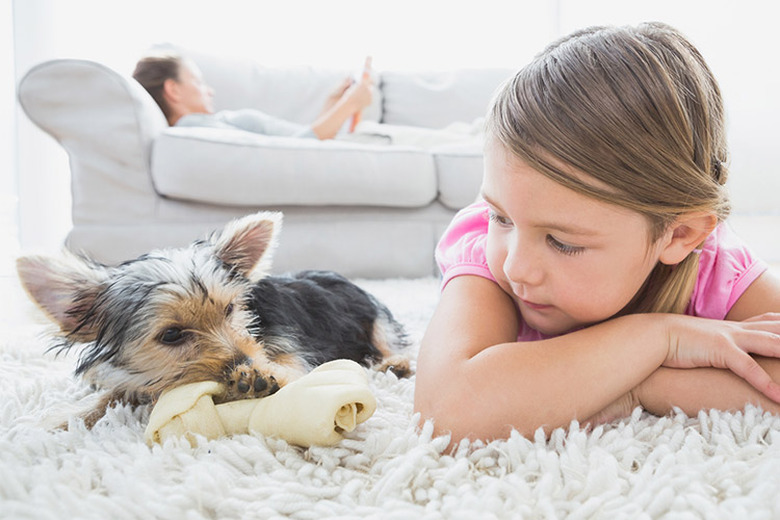Why Would A Puppy Growl At Kids?
Puppies growl at children for a variety of reasons, and not all of them mean that your pup is thinking of biting. Puppies use growling as a form of communication, and they may have trouble expressing themselves in the complex world of living with humans. Combine that with often unpredictable behavior of children, and it is easy to see why your puppy may growl.
Feels Threatened
Your puppy may be growling at children because he feels threatened by them. Children act much different than adults, they are closer to the ground, move quicker and are louder. Even the most well adjusted puppy may have trouble interpreting what the child is going to do next, and it can make him nervous. He responds with his limited vocabulary, by growling. Whether this growing will escalate into a bite depends on a number of things, including the puppy's personality and how aggressive the child behaves.
Guarding Belongings
Children often have trouble recognizing boundaries. They may grab toys that belong to your puppy, plop down on his bed, or even stick their hand into his food dish to sample his dinner. If your puppy thinks that a child is getting ready to take something that belongs to him, he may crouch over the object and growl. If the child keeps moving toward whatever the puppy is guarding, the situation could escalate quickly.
Frustration
Even a puppy who enjoys playing with children may get frustrated and growl. Children don't have experience picking up on subtle cues that the puppy is getting frustrated and needs a break. Games that a child may think are fun, like keep away with a favorite toy or rough housing, can wear out your puppy's good nature relatively quickly. Close supervision by an adult, ready to intervene when they notice the puppy losing patience, is the best way to put a stop to frustration growling.
Playful
Not all growling is aggressive. Your puppy may growl as a way to communicate that he is having fun playing with the child, the same way they would growl at a littermate. This type of growling is not likely to escalate into aggressive behavior, but it may still frighten a child. It is important to supervise your puppy while he is playing with a child, even if they both seem to enjoy it, because your puppy, who is after all, immature, may switch from feeling playful to frustrated relatively quickly.
By Stephanie Dube Dwilson
References
Dog Talk: Growling
Veterinary Partner: Growling Dogs
About the Author
With features published by media such as Business Week and Fox News, Stephanie Dube Dwilson is an accomplished writer with a law degree and a master's in science and technology journalism. She has written for law firms, public relations and marketing agencies, science and technology websites, and business magazines.
